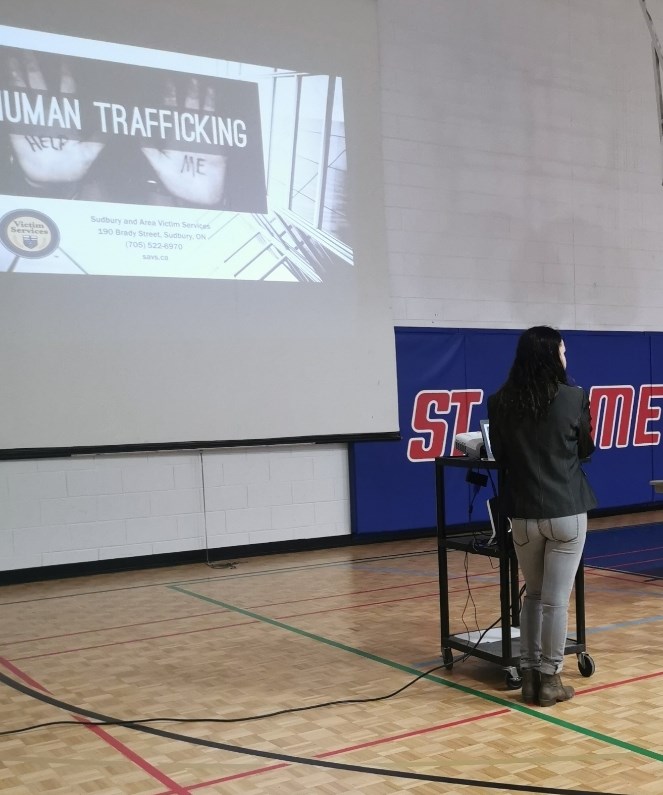Sexual exploitation, trauma, victimization, retraumatization. Does the cycle ever end? Perhaps for some, not for most though. Sudbury and Area Victim Services (SAVS) say that an alarming number of victims of gender-based violence are revictimized by things like media coverage of their cases, social media campaigns of the offenders and their supporters, smear and slander.
Some may say sticks and stones; however, the evidence points to a startling phenomenon of victims having severe mental health events following things like offender conviction, sentencing, appeals and release. The Victim Quick Response Program through the Ontario government and Victim Services provides supports in the immediate, but what about the aftermath? Where is the support then?
Meet Deanna. Deanna is a survivor. An advocate for those who have been harmed. She has been a youth victim as well as a young adult trying to navigate the system with little guidance or support. She wants to change things to make other youth victims not have to experience things the way that she did.
Deanna has struggled with childhood abuse and victimization and, as a result to that, addictions to cope with the trauma of her past. She has lived a lifetime already at only 23 years old, her old soul voice speaks with wisdom and compassion, and a fiery commitment to change. Not only does Deanna have a full-time job, but she is working towards her Red Seal in her trade. She also sits as an advisor on the Greater Sudbury Anti-Human Trafficking Coalition and facilitates presentations about gender-based violence and teaches life skills to at-risk youth. Deanna wants to be the adult that she needed when she was a kid.
Although from the outside the picture of Deanna’s life looks like she is doing great, she is, but what she doesn’t often share is the daily struggles that can be triggered by things like newspaper articles, as we live in a country with free press, and with a few clicks or scrolls, you can find out the most intimate details of a person’s life.

Deanna cautions others that have been victims to reach out for supports both in the immediate and long-term as well. Having a Victim Advocate can help with the initial navigation of things like disclosures, statements, counselling and treatment supports as well as emotional supports. Deanna would say that her Victim Advocate saved her life, a sentiment that many survivors share, but the hard work is always done by the survivors, and the Victim Advocates are merely the navigators there to provide support, assistance and often encouragement. Deanna now finds herself in the position of Victim Advocate and hopes to lobby the government for additional funding for victims who are revictimized and retraumatized.
The word trauma is used to talk about the challenging emotional effects that living through a distressing event can have for an individual. Traumatic events are hard to define because the same event may be more traumatic for some people than for others depending on their history and social location. What makes an event traumatic for an individual is that that event falls outside of that person’s ability to cope or manage the event – and a person’s ability to cope or manage is shaped by many factors in their lives.
Re-traumatization is when a victim re-experiences or relives their traumatic experience, or parts of their experience. This can be brought on by having to tell their story to a new counsellor, in court proceedings or having to tell their story to an agency to access support services. It can also happen when they read articles about their case, and is especially hurtful when the article challenges the validity of their experience, or down-plays the crimes committed against them. When someone is re-traumatized, they can experience things like intrusive thoughts, nightmares, panic attacks and hypervigilance, to name a few, but the list of negative effects goes on.
Deanna hopes that other young people will look to her example and find the strength to come forward, the bravery to choose the path of justice and recovery that is right for them and to let them know that there is a light at the end of the darkness.
You do not need to report to police in order to access support from a Victim Advocate.
Be kind and compassionate, you never know what someone else has gone through.
SAVS is a non-profit organization that provides services and supports to victims and survivors of crime and tragic circumstances in Sudbury and surrounding areas. For more information or to make a referral please contact 705-522-6970 or visit us www.savs.ca.
